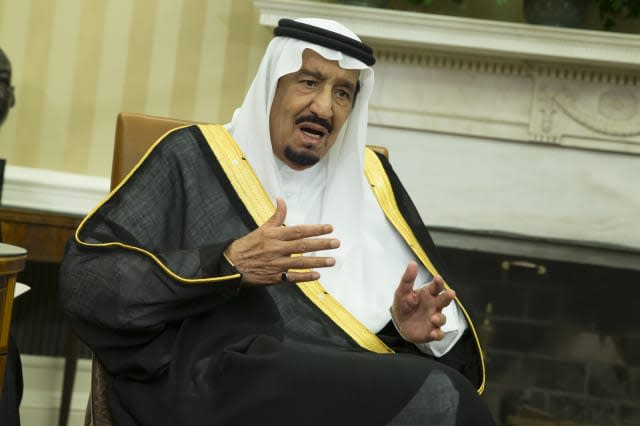Saudi Arabia's 'wall of money' is collapsing

A sovereign wealth fund is a marvellous thing.
You happen to govern a country that is blessed with natural resources. You are foresighted enough to realise that you probably shouldn't blow the entire windfall at once. So you set up a big savings pot – your sovereign wealth fund (SWF for short).
And over the last decade or so, amid the commodities boom, you've watched the cash pile up. A lot of cash. In fact, I've lost track of the number of times that I've seen SWFs described as a 'wall of money', just waiting to flood global asset markets.
But what happens when the fat years end, and the lean begin – and that wall of money starts to crumble?
I'm guessing we're starting to find out...
The river of petrodollars dries up
Saudi Arabia isn't used to being strapped for cash. With oil at more than $100 a barrel, its income more than outstripped its outgoings.
It could spend on keeping the populace happy. It could spend on insulating itself from the Arab Spring. It could spend on trying to find ways to boost solar energy use in the country, rather than consuming its own precious – and limited – reserves of oil.
But now the price of oil has crashed, and Saudi Arabia has decided that the best way to deal with it is to hunker down and starve out the competition in the US, the money isn't flooding in the way it used to. And the trouble is, the Saudis haven't yet adjusted their outgoings to reflect their reduced circumstances.
As the FT reported yesterday, Saudi Arabia's foreign reserves have fallen by around $73bn since oil prices started to slide last year, as it "keeps spending to sustain the economy and fund its military campaign in Yemen". The country recently issued bonds for the first time in a long time, to try to prop up its finances.
That money has to come from somewhere. It's not just sitting in a bank account at the local building society. It's invested – in bonds, in equities, in assets across the globe.
What happens to savers when they suddenly find their income is under pressure? The world's central bankers would tell you that they are inspired to take more risk, to replace the lost income.
But that's where central bankers are wrong. If you're used to saving – if you're used to your outgoings being smaller than your income – then it's a horrible psychological blow when that changes.
And rather than take more risks with your capital, you want to take steps to preserve it in any way possible. That encourages less risk-taking, not more.
So not only are the Saudis pulling out money to fund their overspending, they're also rebalancing their portfolios to take less risk. According to Nigel Sillitoe of researcher Insight Discovery, quoted in the FT piece, the Saudis have "pulled out $50bn-$70bn over the past six months" from various fund managers.
Says one manager, "they are not comfortable with their exposure to global equities". As Izabella Kaminska puts it on FT Alphaville, it's probably fair to assume that means 'emerging markets'.
High oil prices led to massive overproduction
It's ironic really.
Quantitative easing and the financialisation of commodity markets helped to drive up commodity prices in the first place. Consumers in oil-consuming countries paid the price – a massive petrodollar tax that flowed to the Gulf and other oil-producing areas.
Those petrodollars, in turn, were recycled back into the system. They had to be parked somewhere. So they helped to drive up asset prices.
But high oil prices – again, combined with the widespread availability of cheap money – encouraged producers to work on finding alternative sources of oil. That led to massive overproduction.
Oil prices gave way. But even now – again, fuelled by cheap money – companies that should have been forced to halt production have been able to access funding to limp on, still pumping desperately to produce the necessary cash to pay the interest on their debts.
Collapsing oil prices mean the flood of petrodollars stops dead. Saudi Arabia becomes a net spender, rather than a saver. That particular 'wall of money' stops being there to prop up asset prices.
How the tumbling oil price could be inflationary
How significant is this? I'll be looking into this a lot more, but let's consider Norway's SWF. It's the biggest in the world – it owns the equivalent of more than 1% of every single equity in the world. When a player like that starts pulling money out of the market (as it is), that cannot be inconsequential.
The good news of course, is that consumers aren't paying the energy tax anymore. But the money they save on that won't be going into asset markets – it's more likely to be spent.
In fact, you could argue that while this oil price collapse is asset-price deflationary, it's potentially consumer-price inflationary. You've taken a chunk of money that used to end up ultimately being funnelled into asset markets – saved, in other words – and put it in the hands of people who are far more likely to spend it.
Higher overall spending means increased demand, which – all else being equal – means higher inflation.
In the longer run, that'll present a headache for our central banks. But it's not one that they'll notice (or pay attention to) until it's too late.
For now, the sell-off will give the Fed all the excuse it needs to avoid raising rates this year – despite all its protestations to the contrary.
More on AOL Money:
How to profit from the emerging-markets slump
Has oil's comeback started already?
What is quantitative easing for the people?




